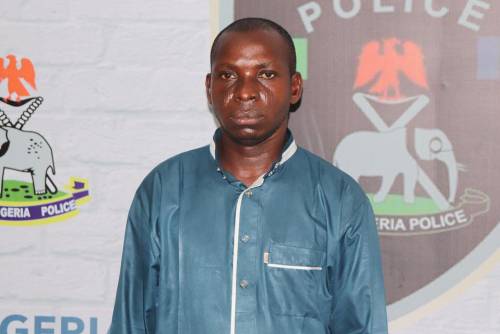…what is the value of calling on security agencies to save us when they are sometimes the problem? This week, the famous kidnapper of Taraba, nicknamed Wadume, was caught in Kano… Reports from the investigation show that he had been in telephone contact with police and army officers hundreds of times during the period that the police were trying to arrest him. We should all be concerned that bandits and terrorists have rogue officers in our security agencies that work for and with them.
Each week, I go through my newsfeed to pick an issue that I would address in my column. I tried to do so this week and got overwhelmed by too many issues. I remembered the powerful story set in a Soviet labour camp in the 1950s that described a single day in the life of an ordinary prisoner, Ivan Denisovich Shukhov. One day, I will write a book about one day in the life of Nigerians. Meanwhile, I still have to submit my column, so let’s go through a few of the juicy stories I could have picked to write on this week.
During the past Saturday, the senior special assistant to the president on media and publicity, Garba Shehu, issued a release stating that his boss is concerned about bandits killing, maiming and extorting innocent citizens. Shehu said the president expressed this while addressing officers and men of the 17th Army Brigade and Nigerian Air Force 213 Operational Base in Katsina, on the platform of “Operation Hadarin Daji”, at the Umaru Musa Yar’Adua Airport, on his way back to Abuja from Katsina. The statement quoted President Buhari as saying: This group was formed by the military to secure the geo-political zone from the activities of bandits. The president then ordered them as the commander-in-chief of the armed forces, as follows: “I don’t think you should spare any bandit. Identify and eliminate them. Pursue them anywhere you can find them and eliminate them.”
The statement raised two issues. The first was the habit of directing security agencies to act whenever something serious happens. Security agencies have the mandate to respond to security breaches whenever and wherever they occur, so why do they have to be told repeatedly to do their job? The second concern is: What does ‘pursue them and eliminate them’ mean? Is it a directive to engage in the extra-judicial killing of all persons suspected to be bandits? This issue would require some clarification as we must not jettison the rule of law.
At a more profound level, what is the value of calling on security agencies to save us when they are sometimes the problem? This week, the famous kidnapper of Taraba, nicknamed Wadume, was caught in Kano. It should be recalled that he had gotten an army captain to get four people killed, including three crack police investigators, to stop the police from prosecuting him. His first statement after he was arrested was that he had many officers within the security agencies on his payroll and they work for him. What happens to citizens when security agents work for bandits and kidnappers for a fee? Reports from the investigation show that he had been in telephone contact with police and army officers hundreds of times during the period that the police were trying to arrest him. We should all be concerned that bandits and terrorists have rogue officers in our security agencies that work for and with them.
Although Boko Haram has been defeated again and again, they continue to attack communities and security agencies, maintaining the regime of terror they have instituted in the North-East. We cannot continue to say Boko Haram has been defeated when we see their actions regularly.
On Wednesday, thousands of Nigerian citizens were feared trapped after Boko Haram fighters attacked two local government areas in northern Borno – Gubio and Magumeri. They took control of the areas without resistance from the military. The two local government areas have a combined population of almost 300,000 inhabitants and the State government has been urging people to return to these loactions as safety is now guaranteed there. Although Boko Haram has been defeated again and again, they continue to attack communities and security agencies, maintaining the regime of terror they have instituted in the North-East. We cannot continue to say Boko Haram has been defeated when we see their actions regularly. Nigeria should avoid the risk of settling into a regular pattern of hit-and-run tactics by terrorists that are denying so many Nigerians the right to live in peace.
On Saturday, an Indigenous People of Biafra (IPOB) group, which my good friend, Jideofor Adibe, calls the “lumpen traderiat”, attacked former deputy Senate president, Ike Ekweremadu in Nuremberg, Germany. He had been invited as a keynote speaker at the occasion of the annual new yam festival and convention of Ndigbo in Germany. After the incident, the group leader, Nnamdi Kanu, in a broadcast on the pirate station, Radio Biafra, asserted that South-East governors and selected Igbo politicians “will receive the Ekweremadu treatment any time they are seen in public abroad.” In response, South-East governors also issued a threat of their own to Nnamdi Kanu – that they would ensure his repatriation back to Nigeria “to face the wrath of the people”, without defining who the people are. This is an indication that they regret their role in seeking his freedom from detention with the federal government. To re-assure top members of the Nigerian elite about their security abroad, the Ministry of Foreign Affairs issued an advisory that all dignitaries should inform them when they are travelling abroad so that measures can be taken to ensure that angry Nigerians abroad do not attack their leaders visiting them.
Also, this week, Okoi Obono-Obla, head of the Special Presidential Panel Investigating Corrupt Practices has gone to court to challenge his investigation by the Independent Corrupt Practices and Other Related Offences Commission (ICPC). In a suit brought before a High Court of the Federal Capital Territory, Mr. Obono-Obla argued that the Commission lacks powers to investigate him over the alleged certificate forgery he has been accused of. It an interesting statement about his understanding of the rule of law – he can investigate others but he is above investigation! It will be recalled that the Nigerian government suspended Mr. Obono-Obla from office, pending the outcome of an investigation by the ICPC on his own alleged corrupt practices. His suspension letter signed by the secretary to the government of the federation, Boss Mustapha, clearly stated that: “this suspension shall subsist pending the conclusion of the on-going ICPC investigations into cases of alleged falsification of records and financial impropriety against your person.”
The other corruption in government story this week was that the head of the civil service of the federation, Mrs. Winifred Ekanem Oyo-Ita, was unable to deliver her lecture at the ministerial retreat on the importance of ethics and professionalism in good governance. She had been placed under investigation over an alleged N3 billion contract scam, money laundering and stealing of government funds. She was reported to have offered her resignation for that strange thing Nigerians call a soft landing, but apparently the decision is a hard landing, whereby she will have her day in court to prove how she got her billions.
Maybe the biggest story of the week was the statement by the director-general of the National Youth Service Corps (NYSC), Brigadier General Shuaibu Ibrahim, that many of the corpers coming for their service are stark illiterates. He said some of them could not read, while others do not even know the English alphabet.
Let’s not forget the small hustlers in the corruption game. This week, the story was reported of a hustler who set up a website offering scholarships to indigent students. 140 students of the Federal University Oye-Ekiti were scammed of N2,000 each, and the fellow pocked the money and disappeared. As his total inflow was just N280,000 and he had to invest in developing a website, I wonder what he gained. Maybe that is not the issue, as he might have been training for bigger hits the next time.
Let’s move from corruption to criminality. This week, the case of rape against Pastor Biodun Fatoyinbo of COZA Church, Abuja was declared inconclusive. The Pentecostal Fellowship of Nigeria (PFN) explained that he refused to appear before the investigation panel they set up on the charges against him, so they have no choice but to declare the matter inconclusive.
Meanwhile, the pastor has fully resumed his professional duties in the Church. The question is that rape is a crime against the State, so why are the police and prosecutorial agencies not investigating the matter?
Maybe the biggest story of the week was the statement by the director-general of the National Youth Service Corps (NYSC), Brigadier General Shuaibu Ibrahim, that many of the corpers coming for their service are stark illiterates. He said some of them could not read, while others do not even know the English alphabet. We are in real trouble when some of our young people who are supposed to have had 16 years of education are completely illiterate.
I almost forgot, this week, 43 new ministers were assigned their portfolios and sworn into office. As we are no longer concerned about the cost of governance, the President has created five new ministries and added more ministers. I wish them well and urge them to get on with the process of governance.
A professor of Political Science and development consultant/expert, Jibrin Ibrahim is a Senior Fellow of the Centre for Democracy and Development, and Chair of the Editorial Board of PREMIUM TIMES.







